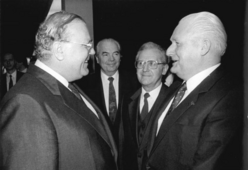Silent War: Difference between revisions
No edit summary |
No edit summary |
||
| Line 10: | Line 10: | ||
|header=Silent War<br>{{small|(1949–1990)}} | |header=Silent War<br>{{small|(1949–1990)}} | ||
<!--|image1=silent war map | <!--|image1=silent war map | ||
|caption1=Borders of [[Continental Security Organization|CSO]] (blue) and [[ | |caption1=Borders of [[Continental Security Organization|CSO]] (blue) and [[Central Patyrian Cooperation Association]] (red) states in 1979. --> | ||
|image2=IvyMike2.jpg | |image2=IvyMike2.jpg | ||
|caption2={{wp|Mushroom cloud}} of the ''[[Aumbolt]]'' {{wp|nuclear test}} conducted by the [[Vierz Empire]] in the Northern [[Cercian Ocean]], 1963; one of thousands conducted during the Silent War. | |caption2={{wp|Mushroom cloud}} of the ''[[Aumbolt]]'' {{wp|nuclear test}} conducted by the [[Vierz Empire]] in the Northern [[Cercian Ocean]], 1963; one of thousands conducted during the Silent War. | ||
| Line 20: | Line 20: | ||
|caption5=The bombed headquarters of the Vierz colonial administration in West [[Oridia]] amid the [[Caraqi Campaign]], 1983. | |caption5=The bombed headquarters of the Vierz colonial administration in West [[Oridia]] amid the [[Caraqi Campaign]], 1983. | ||
}} | }} | ||
The '''Silent War''' was a period of global {{wp|geopolitical}} tension from 1949 to 1990. The [[Vierz Empire]] and its {{wp|satellite states}}, constituting the [[Central Patyrian Cooperation Association]], were engaged in political rivalry with the [[Vonzumier]] and [[Tierada]]-led [[Continental Security Organization]]. The two sides attempted to gain political and military dominance by means of {{wp|proxy conflict}} and the stockpiling of {{wp|nuclear weapons}}. The conflict is described as "silent" due to the {{wp|Cold war (general term)|lack of direct military action}} between the two sides against one another. | |||
The two blocs emerged after the defeat of the [[Socialist International Coalition]] in the [[Great War (Vasarden)|Great War]]. Vierzland, Vonzumier, Tierada, [[Savland]], and [[Allianz (Vasarden)|others]] [[Treaty of Adtrus|emerged victorious]], but disputes between Vierzland and Tierada in particular erupted over Vierzland's occupation and repression of former socialist states. An {{wp|Ideology|ideological}} element emerged as well; Vierzland and its allies were generally {{wp|Authoritarianism|authoritarian}} or {{wp|Monarchy|monarchist}}, while Tierada, Vonzumier, and their allies were mostly {{wp|Democratic republic|democratic republics}}. | The two blocs emerged after the defeat of the [[Socialist International Coalition]] in the [[Great War (Vasarden)|Great War]]. Vierzland, Vonzumier, Tierada, [[Savland]], and [[Allianz (Vasarden)|others]] [[Treaty of Adtrus|emerged victorious]], but disputes between Vierzland and Tierada in particular erupted over Vierzland's occupation and repression of former socialist states. An {{wp|Ideology|ideological}} element emerged as well; Vierzland and its allies were generally {{wp|Authoritarianism|authoritarian}} or {{wp|Monarchy|monarchist}}, while Tierada, Vonzumier, and their allies were mostly {{wp|Democratic republic|democratic republics}}. | ||
The conflict began with the [[Sauvers Memorandum]] of April 1949, which dissolved the [[Allianz (Vasarden)|Alliance of Nations]]. Throughout the war, numerous crises gripped the world as the two blocs wrestled for power and went through phases of confrontation and ''{{wp|détente}}''. The Silent War ultimately culminated in the [[Luepolan War]] wherein Vierzland unsuccessfully fought to restore the overthrown government of [[State of Luepola|Luepola]], formerly its most populous ally in [[Patyria]]. Vierzland's failure to force Luepola back into the CPCA led to its collapse, and ultimately the [[Vierz Revolution]] and the [[Werner Declaration]], which ''de facto'' ended the [[Vierz Empire]] and the Silent War overall. | |||
[[Category:Vasarden]] | [[Category:Vasarden]] | ||
[[Category:Silent War]] | |||
Revision as of 16:30, 30 March 2020
This article is incomplete because it is pending further input from participants, or it is a work-in-progress by one author. Please comment on this article's talk page to share your input, comments and questions. Note: To contribute to this article, you may need to seek help from the author(s) of this page. |
(1949–1990)
The Silent War was a period of global geopolitical tension from 1949 to 1990. The Vierz Empire and its satellite states, constituting the Central Patyrian Cooperation Association, were engaged in political rivalry with the Vonzumier and Tierada-led Continental Security Organization. The two sides attempted to gain political and military dominance by means of proxy conflict and the stockpiling of nuclear weapons. The conflict is described as "silent" due to the lack of direct military action between the two sides against one another.
The two blocs emerged after the defeat of the Socialist International Coalition in the Great War. Vierzland, Vonzumier, Tierada, Savland, and others emerged victorious, but disputes between Vierzland and Tierada in particular erupted over Vierzland's occupation and repression of former socialist states. An ideological element emerged as well; Vierzland and its allies were generally authoritarian or monarchist, while Tierada, Vonzumier, and their allies were mostly democratic republics.
The conflict began with the Sauvers Memorandum of April 1949, which dissolved the Alliance of Nations. Throughout the war, numerous crises gripped the world as the two blocs wrestled for power and went through phases of confrontation and détente. The Silent War ultimately culminated in the Luepolan War wherein Vierzland unsuccessfully fought to restore the overthrown government of Luepola, formerly its most populous ally in Patyria. Vierzland's failure to force Luepola back into the CPCA led to its collapse, and ultimately the Vierz Revolution and the Werner Declaration, which de facto ended the Vierz Empire and the Silent War overall.



